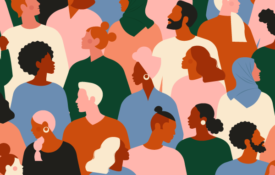-
The Denialist Playbook
Once upon a time, in a land not far away, there was a horrible virus that instilled terror in every town and home. Although most people who became infected showed no symptoms or recovered within a week, in a small fraction of cases the illness progressed, causing loss of reflexes and muscle control, paralysis and, sometimes, death. Children were especially vulnerable, so parents watched anxiously for any sign of infection, often keeping them away from swimming pools, movie theaters, bowling alleys, anywhere where there were crowds and the dreaded microbe might lurk.
-

A Psychologist’s View of Racism and Inequality
APS’s Charles Blue speaks with social psychologist and cultural diversity scholar Dr. James Jones of the University of Delaware.
-

Memories of Past Events Retain Remarkable Fidelity Even as We Age
Even though people tend to remember fewer details about past events as time goes by, the details they do remember are retained with remarkable fidelity.
-
The Surprising Mental Toll of COVID
You didn't need a crystal ball to forecast that the COVID-19 pandemic would devastate mental health. Illness or fear of illness, social isolation, economic insecurity, disruption of routine and loss of loved ones are known risk factors for depression and anxiety. Now studies have confirmed the predictions. But psychologists say the findings also include surprises about the wide extent of mental distress; the way media consumption exacerbates it; and how badly it has affected young people. ...
-
COVID-19 Deniers Are Still All Too Real. Here’s How We Can Convince Them
COVID-19 has killed 250,000 Americans and counting. We’re nine months into the pandemic, and our infection rates are worse than ever. A majority of people across the political spectrum acknowledge the danger of COVID-19. But research has found there’s still a large political divide, as Republicans are less likely to believe science and wear masks. With months to go before a vaccine is widely deployed, there’s still time to change minds and save lives that would otherwise be lost to COVID-19 denial. But how? ...
-
How To Help Your Kids Reframe Their Anxiety — And Reclaim Their Superpowers
Every child feels anxious at times — but for some, that feeling persists and interferes with friendships and schoolwork. It can cause children to be fearful, worried, irritable and angry. And there are physical symptoms: Kids can feel tired and have headaches, stomachaches and trouble sleeping. Anxiety is one of the most common mental health concerns for children. ...

